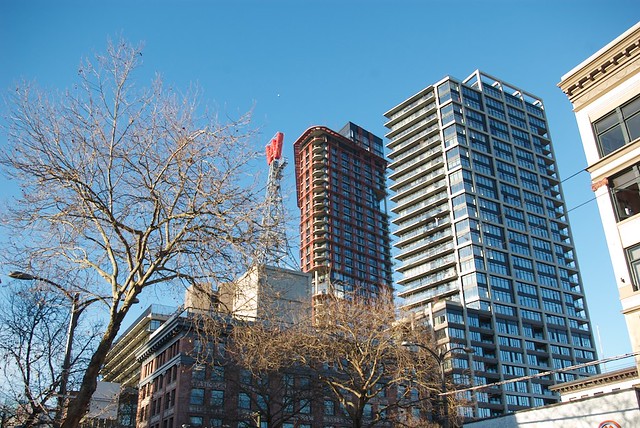
Thanks to a single municipality with clear vision and sturdy backbone — Coquitlam — the juggernaut Regional Growth Strategy (RGS) has at least temporarily failed to careen its done-deal swath across B.C.’s lower mainland. The RGS aims to provide a policy blueprint that would govern the “pattern and form of development” of Metro Vancouver (formerly Greater Vancouver Regional District) for the next thirty years.
Grassroots criticism of the RGS began to acquire momentum in late 2010. MetroVanWatch has established a base for information dissemination and communication on the RGS issue. Various representations were made (or frustrated in attempt) to Metro Vancouver itself and to the 24 constituent jurisdictions. [See appended note for an account of representation to City of Vancouver.]
Points of concern for ordinary people (not bureaucrats, not politicians, not developer interests) have included:
- Dubious public consultation process that culminated in a few poorly advertised, ill-timed public meetings late in 2010 for the affected 2.2 million population (locations were Coquitlam, North Vancouver, Surrey, Burnaby — nothing in Vancouver)
- Effective disregard of the overwhelmingly negative feedback received through the perfunctory public process
- Extensive powers exercised by bodies not accountable to an electorate
- A “strategy” that seeks to substitute growth for livable region
- Facilitation of sprawl growth through removal of land from agricultural reserve and through expansion of urban containment boundary
Coquitlam’s refusal of the RGS on 21 March 2011, following a unanimous vote of their council, has thrown the extended and complex policy project into a “dispute resolution process.” On 8 April 2011 Metro Vancouver set sights on recalcitrant Coquitlam, proposing binding arbitration to force acceptance. Nine Metro Vancouver directors opposed that move.
Ida Chong, the provincial minister responsible, has responded to notification and directed Metro Vancouver to initiate instead “a non-binding dispute resolution process by May 16, 2011.” In other words, the Province told the Region to take off the jackboots.
On Saturday May 14, the Vancouver Sun weighed in heavily on the RGS issue, running both a lead editorial and an opinion piece by Daphne Bramham. The editorial in particular aligns with already reported concerns emanating from the province’s “three biggest business groups” — B.C. Chamber of Commerce, Business Council of B.C., Urban Development Institute. In fact, business interests have sought
to participate in the dispute process, saying they weren’t given the chance to be heard during four years of public consultations. (Sinoski, May 6)
Black humor spreads its wings here. Grassroots critics have been told flatly and repeatedly that the years of process are so adequate they should not dream of making complaint. (Many meetings and passage of much time always provides bureaucratic grounds to assert worth of consultation — regardless of quality of advertisement, extent of engagement, or nature of response to criticisms.) Perhaps business interests will garner more respect?
Besides reinforcing the editorial focus on economic factors, Bramham blasts Metro Vancouver as “probably the most egregious example of Canadian citizens having no voice in decision-making.” Finally grassroots opposition has succeeded in generating this echo in mainstream media.
The worry now is that RGS will be taken to task for the wrong reasons. For example, if the Urban Development Institute wants to affect the current version of policy, it’s hard to believe that things like preservation of agricultural land, respect for a strong urban containment boundary, or maintenance of adequate industrial land will stand at the top of their agenda.
Where all of this RGS debate goes from here depends in part on how well you the reader understand the issues, and whether you take opportunities to speak up.




